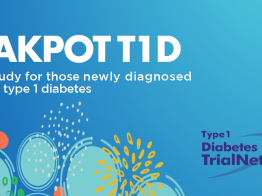
Making the time for T1D research — The Ebner Family, Monroe, Connecticut
With four boys who are active in multiple sports, the Ebners are a busy family. But when one of the Ebner sons was diagnosed with type 1 diabetes (T1D), the family made the time for T1D research.
Elliot Ebner, a sixth grader in Monroe, Conn., became one of the first people to enroll in TrialNet’s JAKPOT T1D Study. The study is testing two different Janus kinase (JAK) inhibitors to see if either or both can preserve insulin production in people newly diagnosed with T1D. Continuing to make even a small amount of insulin helps keep blood glucose levels in the normal range, lowering the risk of long-term complications.
As a study participant, Elliot takes a daily pill containing the study treatment—one of two JAK inhibitors or a placebo (looks like the study treatment but has no active ingredients). Neither the Ebners nor the research team will know which treatment Elliot is receiving until the end of the study. In addition, Elliot’s parents take him to Yale School of Medicine in New Haven—the closest TrialNet location—for quarterly health tests and monitoring.
“So far, everything has been pretty smooth,” said Elliot’s mom, Christine Ebner, a middle school Language Arts teacher. “The doctors and nurses at Yale have been wonderful. They are super communicative and kind.”
Elliot and his family made the decision to participate in the JAKPOT T1D study shortly after he was diagnosed with T1D following a routine wellness checkup. Christine said they didn’t take the decision to join in a clinical study lightly. But they are well aware of the importance of participating in scientific research to help find a cure.
“Even after a diagnosis of T1D, there are remaining beta cells that make detectable levels of insulin,” explains JAKPOT T1D Study Chair Dr. Carmella Evans-Molina. “Our hope is that one or both of the study treatments will calm the body’s immune response, allowing those remaining beta cells to survive and produce insulin for as long as possible.”
If either or both treatments are successful, they may be studied in people at high risk for T1D to see if they can prevent or delay clinical diagnosis.
Elliot didn’t have any noticeable symptoms before his T1D diagnosis, and there was no history of T1D in the family. But a benefit of participating in TrialNet is that Elliot’s three brothers have since been screened. So far everyone has tested negative for the autoantibodies that signal an increased risk for T1D.
According to Christine, while the T1D diagnosis came as a surprise and has required some adjustments, the most important thing is that Elliot is getting great care. Meanwhile, he’s been able to continue playing his favorite sports, including travel baseball and basketball.
Christine encourages other families to consider taking part in T1D research. “While it’s an individual decision, it was the right decision for us. The more research we are able to conduct for T1D, the closer we will get to a cure.”
About the JAKPOT T1D Study
The JAKPOT T1D Study is testing two different treatments – abrocitinib and ritlecitinib – to see if either or both can preserve insulin production in people newly diagnosed with type 1 diabetes (T1D).
Abrocitinib and ritlecitinib are in a new class of autoimmune treatments called Janus kinase (JAK) inhibitors. Both are being used and studied in other autoimmune diseases. Abrocitinib is approved by the U.S. Food and Drug Administration (FDA) to treat eczema. Ritlecitinib is being studied as a treatment for several autoimmune diseases, including alopecia, ulcerative colitis, Crohn’s disease, vitiligo, and rheumatoid arthritis.
The JAKPOT T1D Study will enroll 78 people between the ages of 12 and 35 diagnosed with T1D in the past three months. Two-thirds of the participants will receive active study treatment: 26 will get abrocitinib and 26 will get ritlecitinib. The other third will get a placebo. Treatment will be randomly assigned, and neither the participants nor the study team will know who is receiving which treatment until the end of the study.
For the first year of the study (treatment phase), participants will take a daily pill and visit a study site every three months for tests and monitoring. In the second year (follow up phase), participants will visit the study site every six months. Everyone will receive guidance for intensive diabetes management.
To learn more about this and other TrialNet studies, visit Our Research | TRIALNET Type 1 Diabetes TrialNet.






